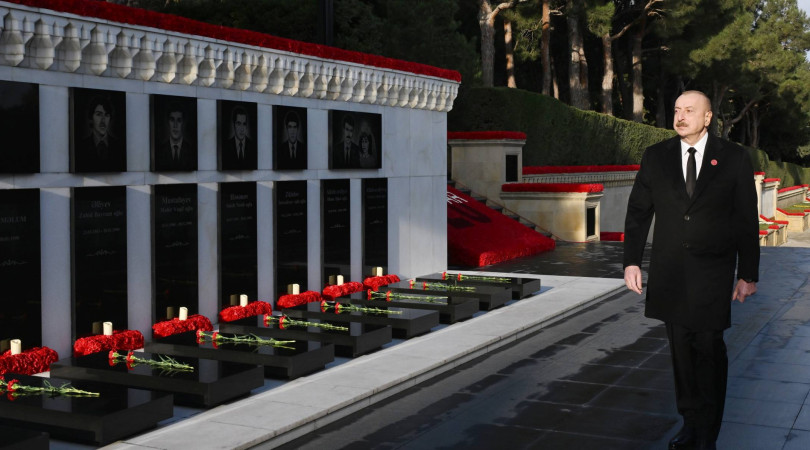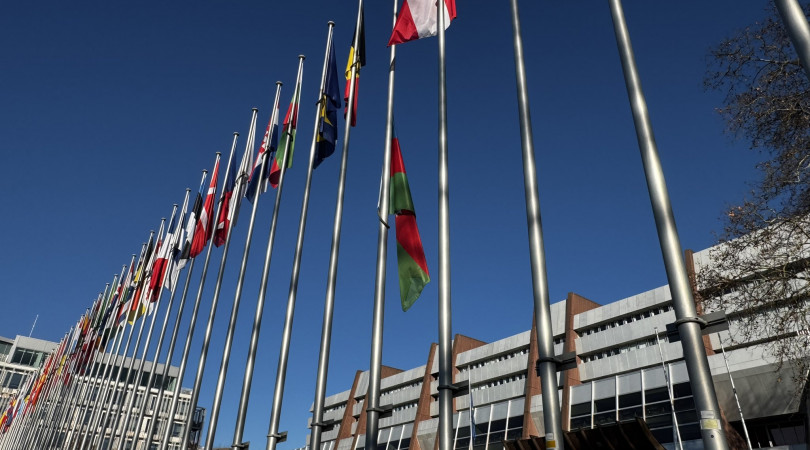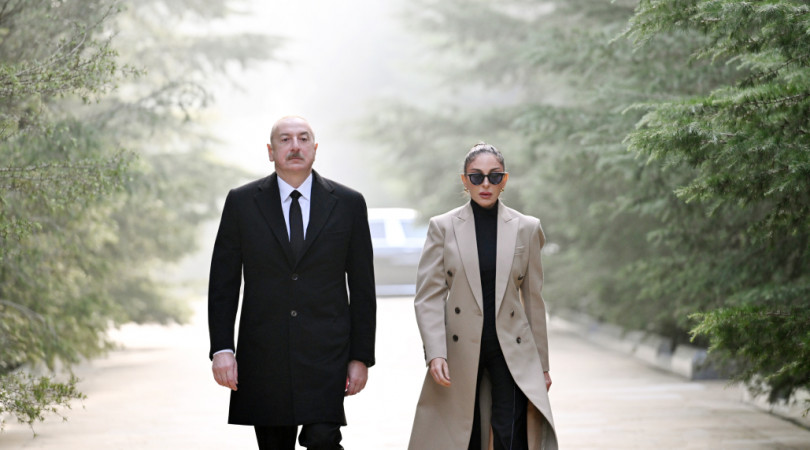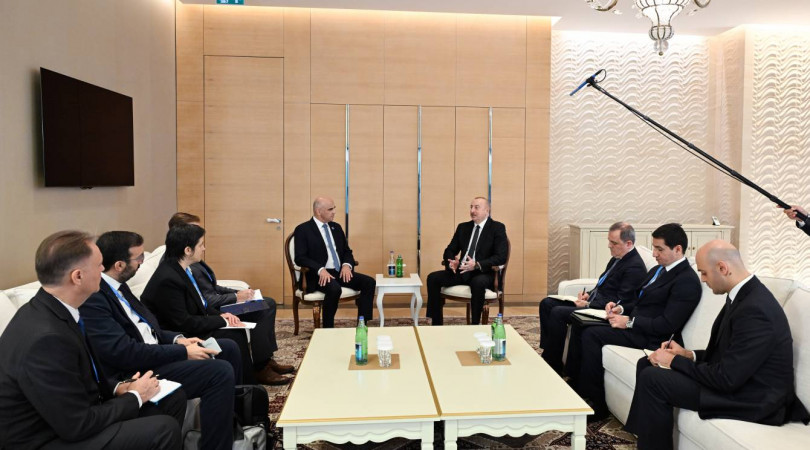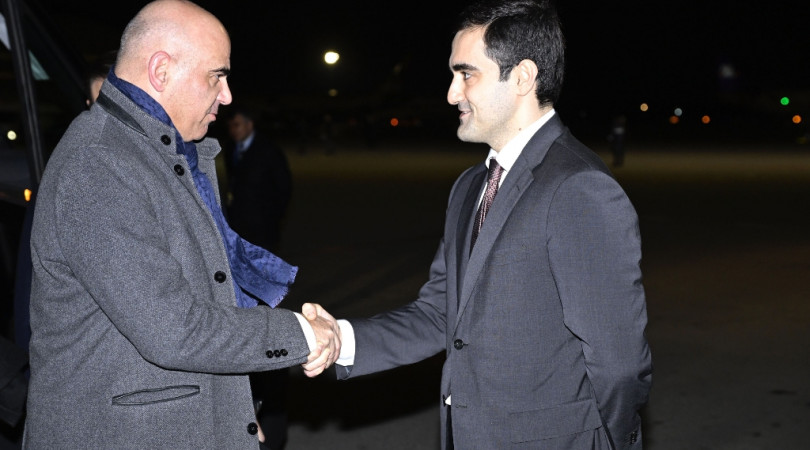President Ilham Aliyev attended opening of 4th World Forum on Intercultural Dialogue
President of the Republic of Azerbaijan Ilham Aliyev and first lady Mehriban Aliyeva have attended the opening of the 4th World Forum on Intercultural Dialogue on the theme "Advancing Intercultural Dialogue: New Avenues for Human Security, Peace and Sustainable Development" at the Heydar Aliyev Center. The forum is organized in cooperation with UNESCO, the UN Alliance of Civilizations, the UN World Tourism Organization (WTO), the Council of Europe, the Islamic Educational, Scientific and Cultural Organization (ISESCO), the Food and Agriculture Organization of the United Nations (FAO) and the North-South Center of the Council of Europe.
Prior to the opening ceremony participants posed together for photos.
The head of state made a speech at the opening ceremony.
Speech of President Ilham Aliyev
Ladies and gentlemen,
Dear guests,
First of all, I would like to thank our guests for participating in the 4th World Forum on Intercultural Dialogue. We put forward this initiative six years ago and the first World Forum on Intercultural Dialogue was held in Baku. Since that time this forum has turned into a global international event addressing one of the most important issues on the world agenda – intercultural dialogue. Every international event, every forum, its importance is judged not only by the topics of discussions, but also by the list of its participants. We are very happy that more than 800 guests representing more than 120 countries participate today at the forum and more than 50 international organizations sent their high representatives to Baku.
This, first of all, demonstrates the importance of the forum, and at the same time the importance of the discussions, which we will have today and tomorrow. We are proud that the number of partners and organizers of the forum is also growing. The government of Azerbaijan is organizing this forum in partnership with UNESCO, United Nations Alliance of Civilizations, ISESCO, Council of Europe, World Tourism Organization, and Food and Agriculture Organization.
I am sure that the discussions and exchange of views during the forum will contribute to promotion of intercultural dialogue. Azerbaijan for centuries has been a place where civilizations and cultures met. Our geography, our history and development in Azerbaijan demonstrate that intercultural dialogue is one of the most important issues in the history and also today because without that the world would be much more in danger.
Our history, our traditions, our geography actually dictated that Azerbaijan could be and should be an area where civilizations meet. And for centuries, people who inhabited Azerbaijan, have always lived in a diverse environment. Multiculturalism, ethnic and religious diversity is our history and is today’s reality. And we are proud of that.
Today Azerbaijan is a multi-ethnic, multi-confessional country, where representatives of all the ethnic groups and religions live in peace and harmony. Our historical monuments also clearly demonstrate the cultural diversity of Azerbaijan and its ancient history. We are proud that one of the oldest mosques in the world, Juma Mosque built in 743, is situated in one of the ancient cities of Azerbaijan, Shamakhi. One of the world`s oldest churches, the church of the ancient state of Caucasian Albania is also situated in another ancient Azerbaijani city of Shaki.
In Baku, the Fire Temple, which belongs to the religion of Zoroastrism, also demonstrates our cultural and religious diversity. Today, mosques, churches, synagogues, which exist in Azerbaijan, are protected by our state. Many of them were built with the state financing, which demonstrates our history, and also demonstrates our policy.
Multiculturalism is a state policy in Azerbaijan, and at the same time, it’s our lifestyle. Though the word multiculturalism is relatively new and sometimes very difficult to pronounce, but the ideas of multiculturalism always existed in our country. Regardless of the time of history, regardless of the political system in Azerbaijan, our people always were active defenders and promoters of multiculturalism inside Azerbaijan and beyond our borders.
Actually the decision to organize, for the first time in 2011, a forum, which will address intercultural dialogue, was motivated by our history, by our reality and also by our wish to create a broad format to address these issues. Today we need to do it maybe more than ever before because unfortunately now some concerning tendencies in the world lead sometimes not to cultural, intercultural dialogue, but to alienation. We see it regularly that in different parts of the world the conflicts, confrontations, civil wars are generated by lack of understanding between representatives of different religions, different ethnic groups. Our policy of multiculturalism is fully supported by our people. 2016 was announced the Year of Multiculturalism in Azerbaijan. This year is announced the Year of Islamic Solidarity. The combination of these two very important elements of Azerbaijan’s day to day life, first of all, demonstrates the status of our society, our state policy and also leads to greater understanding in the region.
We held several important international events addressing particularly this issue. Five times Azerbaijan organized International Humanitarian Forum. We organized the World Religious Leaders Summit several years ago. Last year the 7th Global Forum of Alliance of Civilizations was very successfully held in Baku. And of course, for the fourth time we gathered to address the issues of intercultural dialogue.
All this helps us to find the ways how to reduce tensions, how to reduce risks, how to create better understanding between peoples and religions. And I think that the history of Azerbaijan, and its today’s development is a good example that it is possible to achieve success.
There are different views about multiculturalism. We sometimes hear from different public figures, politicians, leaders of countries different skeptical views about that. I think that if we unite our efforts – and today the representatives of the absolute majority of the international community are here – we can demonstrate and prove that multiculturalism is alive and there is no alternative to that. Alternative is xenophobia, alternative is Islamophobia, anti-Semitism, racism, discrimination. Multiculturalism is not only a trend, it is the only way how to make the world safer.
I think that your presence at this forum and the topics of discussions clearly demonstrate our common will and our policy, and our approach to promoting these values.
In 2008, Azerbaijan initiated a very important process, which later was called Baku Process, and which is now highly appreciated by the international community. That initiative also was generated by these factors, which I already described, and also the fact that Azerbaijan is one of the very few countries, which is a member of the Organization of Islamic Cooperation and the Council of Europe at the same time.
In 2008, when we organized a meeting of ministers of member states of the Council of Europe we invited ministers from countries of the Organization of Islamic Cooperation. That was the first time when representatives of more than 100 countries came together for such a big gathering to address important issues of intercultural relations. In 2009, Azerbaijan as a member of the Organization of Islamic Cooperation was hosting the meeting of the ministers, and invited the ministers of the Council of Europe countries. This initiative and this format later was called Baku Process. We are proud of that. First of all, because it was our initiative, second, because I think Baku, Azerbaijan deserves to be the center of intercultural dialogue.
Next year we will celebrate the 10th anniversary of Baku Process. The government of Azerbaijan and United Nations Alliance of Civilizations launched an initiative to create an award, Baku Process award for leadership in intercultural dialogue, which will be presented to those who play a very active role in promotion of dialogue of cultures and dialogue of civilizations.
Another important initiative launched by Azerbaijan was to organize European Games in Baku. Unlike other continental games, European Games were never held before. And when European Olympic Committee decided to organize these Games there were not many bidders and frankly speaking Azerbaijan was the only country, which made a proposal to organize these Games in Baku. Probably, if not for that, these games could have never been organized.
2015 was the year of inaugural European Games held in Baku with participation of more than 5,000 European athletes. These Games were, of course, a sporting event. At the same time, I think it was symbolic that the first European Games were organized in a Muslim country. That was demonstration of multiculturalism. That was demonstration of religious tolerance. The Games were organized at the high level and the athletes and guests were very satisfied and happy with the organization and also with the reception from the people of Azerbaijan who showed their traditional hospitality to our European guests.
This year, just in one week, we will start the fourth Islamic Solidarity Games with participation of all the Muslim countries and more than 3,000 athletes. So, in two years` time, in one city, European Games and Islamic Games are held – this is demonstration of our policy and our intentions. The Games are not only a sporting event. Though, of course, I am sure there will be a very strong competition. It is an event, which unites people. We need unity, first of all, in the Muslim world.
Unfortunately, it is the Muslim countries that suffer most of all from terrorism. Azerbaijan plays a very important role in promotion of Islamic values. We organize different international events in European capitals – presentations, exhibitions to demonstrate the ancient Islamic culture. We are one of the most active countries to fight against Islamophobia and attempts to connect Islam with terror. So, we need unity in the Muslim world in order to make our region safer. And, at the same time, we need active communication between the Organization of Islamic Cooperation, the Council of Europe, and other international organizations to reduce tensions.
Therefore, when we are talking about intercultural dialogue, we clearly understand that the impact of success of this dialogue can be seen in every area – in political life, in the areas related to security, in economic cooperation because without predictable partnership and the relations based on mutual respect today it will be very difficult to achieve the goals every country puts in front of itself.
Therefore, these initiatives and the success story of Azerbaijan as one of the international centers of multiculturalism – and by the way we created the international center of multiculturalism – demonstrate that we are not only on the right track, but we are moving successfully. And today’s forum, which embraces the whole world, is a clear demonstration of our intentions.
Azerbaijan is a relatively young, independent country, though the country with a great history, traditions, and culture. But as an independent country we are only 25 years old. Last year we celebrated the 25th anniversary of restoration of our independence and these years clearly demonstrate that when the fate of your country is in your hands you can achieve great success. Azerbaijan for centuries was part of different countries, empires. Today 25 years of independence clearly demonstrate that only being free we can achieve success. Never in the history of our nation Azerbaijan was as strong as it is today.
We made significant achievements in social, economic, political life. Today Azerbaijan is a rapidly developing, dynamic, modern country, which is very close to its roots, traditional roots, but at the same time, open to the world, modern.
The biggest problem we are facing is Armenian occupation. Unfortunately, our restoration of independence was accompanied by Armenian aggression, which resulted in occupation of 20 per cent of our internationally recognized territory – Nagorno-Karabakh and seven other districts – which are occupied by Armenia. As a result of this occupation more than one million Azerbaijanis became refugees and internally displaced persons. Our people were a subject of ethnic cleansing. And today on the occupied territories all our historical monuments, buildings are demolished by Armenia. Our mosques are destroyed.
Here, in the center of Baku, we renovated an Armenian church, but on the occupied territories Armenia demolished all our historical and religious heritage. The pictures of that can be obtained through the internet. At the same time, OSCE sent two times fact-finding missions to the occupied territories and in its reports clearly reflected the devastation of the occupied territories. United Nations Security Council, the highest international body, four times adopted resolutions, four resolutions, which demand immediate and unconditional withdrawal of Armenian troops from the occupied territories. For more than 20 years these resolutions have not been implemented. Armenia ignores them and violates brutally international law and decisions of Security Council and there is no mechanism to force the aggressor to comply with the resolutions. And this is a very important issue, which is of big concern to our people that sometimes decisions of Security Council of the United Nations are implemented within days, if not hours, but in our case it’s more than 20 years. This is demonstration of double standards, first of all, and this is also demonstration, to certain degree, of inefficiency of mechanisms of implementation of resolutions.
The resolution of the conflict must be based on international law norms, United Nations Charter, Helsinki Final Act and territorial integrity of Azerbaijan. The whole world recognizes the territorial integrity of Azerbaijan. Nagorno-Karabakh is a historical and legal part of our country.
Despite this tragedy and very heavy economic burden – because of more than a million refugees especially in the beginning of 1990s when we were very poor – there was a very serious economic problem and social problem for us. We managed to mobilize our efforts and build a strong country. Today Azerbaijan is a politically, economically stable country. Azerbaijan is a very respected member of the international community. I can name many facts to demonstrate it. Only one, I think, will be enough.
Several years ago, 155 countries voted for Azerbaijan to elect it as a non-permanent member of United Nations Security Council. So, this support of the absolute majority of countries of the world demonstrates that Azerbaijan has a very good international reputation. We are a very active member of the Organization of Islamic Cooperation. At the same time, with nine member countries of the European Union Azerbaijan signed or adopted documents on strategic partnership.
This is a role we are playing in the region. And we managed to transform our geographical location into important infrastructure facilities. Today, transportation projects, which we initiated, connecting by railroad Asia with Europe, already generate a lot of profit, at the same time, create very important links between countries.
At the same time, Azerbaijan is the initiator of huge energy projects. One of them, which is being implemented now, is the biggest infrastructure project in Europe worth 40 billion US dollars of investment – Southern Gas Corridor – that will connect seven countries at the first stage and will provide energy diversification and energy security for many countries of our region, of Central Europe and Southern Europe. So, this is a project of energy security, energy diversification, and cooperation because all the countries involved in our energy and transportation projects are becoming natural partners and will be mutually interdependent. And interdependency is one of the important factors for economic cooperation and for mutual respect.
So, transportation and energy projects, which were initiated by Azerbaijan, of course, serve the cause of development and prosperity. At the same time, it is our investment in international cooperation and intercultural dialogue.
Our economic performance also was very impressive. For the last 13 years our economy, GDP grew more than three times. We managed to reduce unemployment down to five per cent, poverty is less than six per cent. We have a very low level of foreign debt, only 20 per cent of our GDP. Our reserves are five times bigger than our foreign debt. So, it is really a very impressive economic performance, which, by the way, is highly appreciated by international institutions. Davos World Economic Forum ranks Azerbaijan`s economy number 37 with respect to competitiveness. In another assessment of Davos Economic Forum with respect to the development of developing countries, Azerbaijan is sharing the first and second places.
All this is a big asset, which was created in the years of independence. We invest largely in education. Today the level of literacy in Azerbaijan is close to 100 per cent. More than 3,000 schools were built in our country during the last decade. Investments in education, as we all know very well, is investments in the future. At the same time, it is investment in stability and security because radicalism, extremism, fundamentalism are generated mainly by illiteracy, lack of education when young generation is brainwashed and is directed to commit terrible acts of terror. Illiteracy, poverty, social inequality and injustice these are the main sources of radicalism. Therefore, in order to eradicate radicalism, we need to address these fundamental reasons. At the same time, we need to promote the values of interculturalism so that people clearly see the benefits of peaceful coexistence of living side by side.
Here we also come to a very important issue of responsibility. Responsibility of politicians, who sometimes in order to gain more votes from radicals are changing their program to be more nationalistic. Responsibility of non-governmental organizations. Some of them deliberately provoke tensions based on religious and ethnic roots. And responsibility of media because what we mainly see in international media is migrant crisis, wars, devastations, clashes, religious and ethnic conflicts.
But there are a lot of positive examples. We need also to demonstrate them. I think one of the goals and importance of this forum is that we are addressing this issue, we are uniting our efforts. All the delegates and participants of the forum, I’m sure, came here with one agenda – how to strengthen and promote the values of intercultural dialogue.
I’m sure that results of the forum will be successful and we will implement all the decisions of the forum. Once again I would like to thank you for being with us, and wish the forum success. Thank you.
X X X
Other speakers at the event included UNESCO Director General Irina Bokova, UN High Representative for the Alliance of Civilizations Nassir Abdulaziz Al-Nasser, Secretary General of the World Tourism Organization (UNWTO) Taleb Rifai, Secretary General of the Organization of Islamic Cooperation (OIC) Yousef Al-Othaimeen, Director General of the Islamic Educational, Scientific and Cultural Organization (ISESCO) Abdulaziz Othman Altwaijri and Deputy Secretary General of the Council of Europe Gabriella Battaini-Dragoni.
Chief of the Cabinet at FAO Mario Lubetkin read out FAO Director-General Josè Graziano Da Silva's congratulatory message to the forum participants.
The forum brings together more than 800 foreign delegations, including high-ranking state and government officials, heads of international organizations, parliamentary leaders, renowned scholars, ambassadors and public figures.
This is for the first time that heads of more than 25 international organizations participate in the forum, which has become a platform for global cultural dialogue. The forum will feature a joint high-level meeting of the heads of international organizations for the first time this year, in addition to nearly 40 sessions and events.

